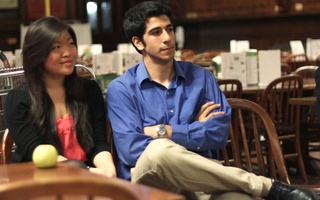“Shit people say” is an extraordinarily broad category. It covers everything from your perpetually profound comments about the weather, to the obnoxious thing that kid said in section, to Abraham Lincoln’s Gettysburg Address. Sometimes even the greatest sayers of things get tired of saying things; Hamlet must “like a whore unpack my heart with words,” and even accounting for the Prince’s taste for melodrama, it still can seem like we talk too much but say too little. The ability to have your voice be “heard” has expanded exponentially, as if hundreds of millions of people were given free megaphones. Sometimes this is an enriching thing, as when we hear the voices of protestors struggling to speak freely. Other times, it can be debilitating; there is something vaguely depressing about measuring out our lives in status updates. Either way, it’s distracting, making it difficult to hear our own voice. But that’s ok, because we have funny videos to tell us what we say and how we talk to each other. Right?
“Shit Girls Say” was created by Graydon Sheppard and Kyle Humphrey and posted to YouTube about a month ago, and has been viewed over 13 million times. But even these numbers belie its productivity, the way in which it has become a platform or, dare I say, an inspiration, for a whole bevy of spinoffs and amendments. But there is something about the spontaneity of their generation that should give us pause. Eventually, no matter who we are, we will find ourselves parodied and see our own repetitions revealed. Behind the laughter lies the terrifying possibility that if we could redact ourselves, we would sound the same as the people in the videos. Protected by a way of listening and speaking that treats every expression as an unedited rough draft, we pleasurably drown in an illusion of difference when we all pretty much say the same thing, over and over again. In his experimental novel “A,” Andy Warhol showed that if you tape-record human speech, the transcript is gibberish, snowed under by “uums” and “uhs” and punctuated with “you knows.” “Shit people say” makes the opposite argument: Underneath it all is a contiguous and seamless structure of pre-fabricated phrases that are instantly intelligible; they show us ourselves, a revelation predicated on reifying categories that we talk our way into all the time.
The success of the “shit people say” meme is telling because it illustrates both the peril and potential of a new way of speaking and hearing. Debates about how different groups use language reveals what creates a shared language by illustrating how it can be simultaneously regionalized and made intelligible; its dialect is conveyed in the lingua franca. But it also reinforces the ways in which our language is never entirely our own. Unknowingly, we share words and phrases and ways of thinking in common. We rent, rather than own, the words that we speak. No words are loaned out to more people than curse words. They are so interesting because they are both overloaded with meaning and entirely evacuated of it. By describing the content of speech as “shit,” we immediately devaluate it and, more importantly, efface the potential for differentiation. But the totalizing reductionism of the meme is not entirely generated by the s-word. “Thing” would serve just as well to remind us just how unoriginal we can be—space-fillers rather than meaning-makers.
The overwhelming response to “shit people say” is recognition, identification, and validation; it makes us laugh because it seems true. But I don’t think that’s right. It doesn’t do justice to the nuanced, textured conversations I hear in the dining hall all the time, nor to the passion and insights I am privy to in more academic settings. If we are going to be prosaic and banal (and we are, a lot of time), let us at least own that vulgarity and coin our own content. In a world of texts, emails, and Tweets, we have so many opportunities to be eloquent, funny, sexy, and scandalous. Seize them, and say shit that’s not ours, or theirs, or mine, but yours.
Ari R. Hoffman ’10, a graduate of the College, is a Ph.D. candidate in English. His column appears on alternate Fridays.
Read more in Opinion
An Unfair and Groundless Epithet


















